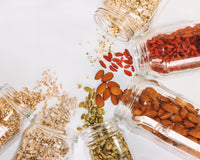With spring just around the corner, it’s due to put many people in a happier mood. Longer daylight hours, better weather, and seeing flowers bloom again after a long, cold winter can put a real spring in your step!
But did you know the food you eat can also affect your mood? We know that food can have an effect on your physical health but recently, more studies on the relationship between mental health and nutrition have been emerging.
When you’re feeling down or after a stressful day it’s tempting to indulge by reaching for fast food or a sugary treat to comfort yourself and lift your spirits. But many of these type of foods can actually cause the opposite and have a negative effect on your mood.
Read on to find out how food impacts your mood and what you should be consuming to maintain not just your physical health, but your mental health too.
Eat Regularly
We’re sure you’ve heard the phrase ‘breakfast is the most important meal of the day’ – and there’s a lot of truth to it! Eating a balanced breakfast on a daily basis can improve your mood, memory, and energy throughout the day.
If you’ve ever missed breakfast, you may have noticed yourself feeling more tired and grumpy throughout the day. This is because a drop in your blood sugar may leave you feeling tired, agitated and depressed. That’s why it’s best to start the day off right with a wholesome breakfast and continuing to eat regularly throughout the day, keeping your blood sugar and energy levels stable.
Stay Hydrated
Did you now that the human brain is comprised of around 75% water? Given that fact, it makes sense how important it is to keep yourself adequately hydrated throughout the day.
Studies have shown that even mild dehydration can have a significant impact not only on your mood, but also your energy and even your ability to think clearly. Staying hydrated by drinking enough water may seem simple, but it is a crucial component of optimal physical, emotional, and mental health.
Manage Caffeine
Caffeine is a stimulant that does have its perks, such as increased alertness, elevated cognitive function and a boost in energy. However, consuming too much caffeine can cause irritability, restlessness and headaches, especially in people who aren't accustomed to it.
Caffeine can also affect your sleep quality and may even cause insomnia if consumed later on in the day. Lack of sleep can in turn lead to low mood, and over time can contribute to mental health conditions such as depression and anxiety.
Look After Gut Health
Have you ever noticed that sometimes your gut can reflect how you are feeling emotionally? Feelings of stress or anxiety can cause your gut to either slow down or speed up. There have been many studies on the connection between the brain and the gut, also known as the gut-brain axis. This means what affects your brain, also affects your gut, and vice-versa. Therefore, correcting the types of bacteria in your gut, as well as improving digestion, may benefit brain health.
Up to 90% of our serotonin receptors are also found in the stomach. Serotonin is a chemical in the brain that is responsible for regulating happiness, anxiety, and mood, and gut problems suggest you might not create enough. Decreased levels of serotonin are connected to mood swings, depression, and anxiety disorders.
Be Mindful of Sugar
We know, we know, when you’ve had a rough day, having a tasty sugar laden treat may be exactly what you’re craving to cheer yourself up. But researchers have reported a parallel between increased sugar intake and mood disorders.
After eating sugar, you may feel good for a time. Sugar satisfies the craving centres in the brain along with increasing your blood pressure and energy levels. But a few hours later, you may be left feeling fatigued, cranky, a bit mentally foggy, or perhaps slightly anxious or unhappy. This is due to the spike in blood sugar, followed by the crash.
Mood Boosting Foods
So, what kinds of foods should you be eating if you want to improve your mood? Certain foods contain nutrients or chemicals that affect how the brain functions, and as a result, impacts your mood.
A range of foods such as oily fish, fermented foods and high-fibre foods, like oats may help increase the favourable bacteria in your gut and enhance brain health. Some nuts and seeds are high in nutrients such as zinc, tryptophan and selenium, which may support brain function and lower your risk of depression. Lentils and beans are rich sources of mood-boosting nutrients, especially B vitamins. For fruits try bananas which are high in vitamin B6 and fibre, or berries which are an excellent source of antioxidants that can help decrease mood disorders.
In conclusion, there does seem to be evidence to suggest there is a link between what we put in our bodies and the affect it has on your mood and mental heath overall. However, more research does still need to be done on the topic. But always remember that eating the right foods is just part of the solution in preventing or treating mood problems or mental health conditions.






